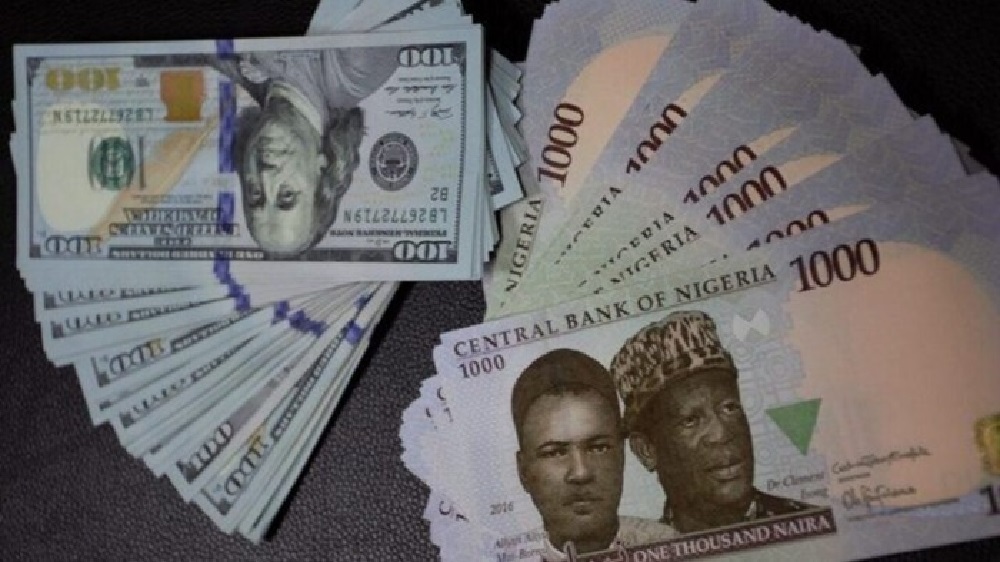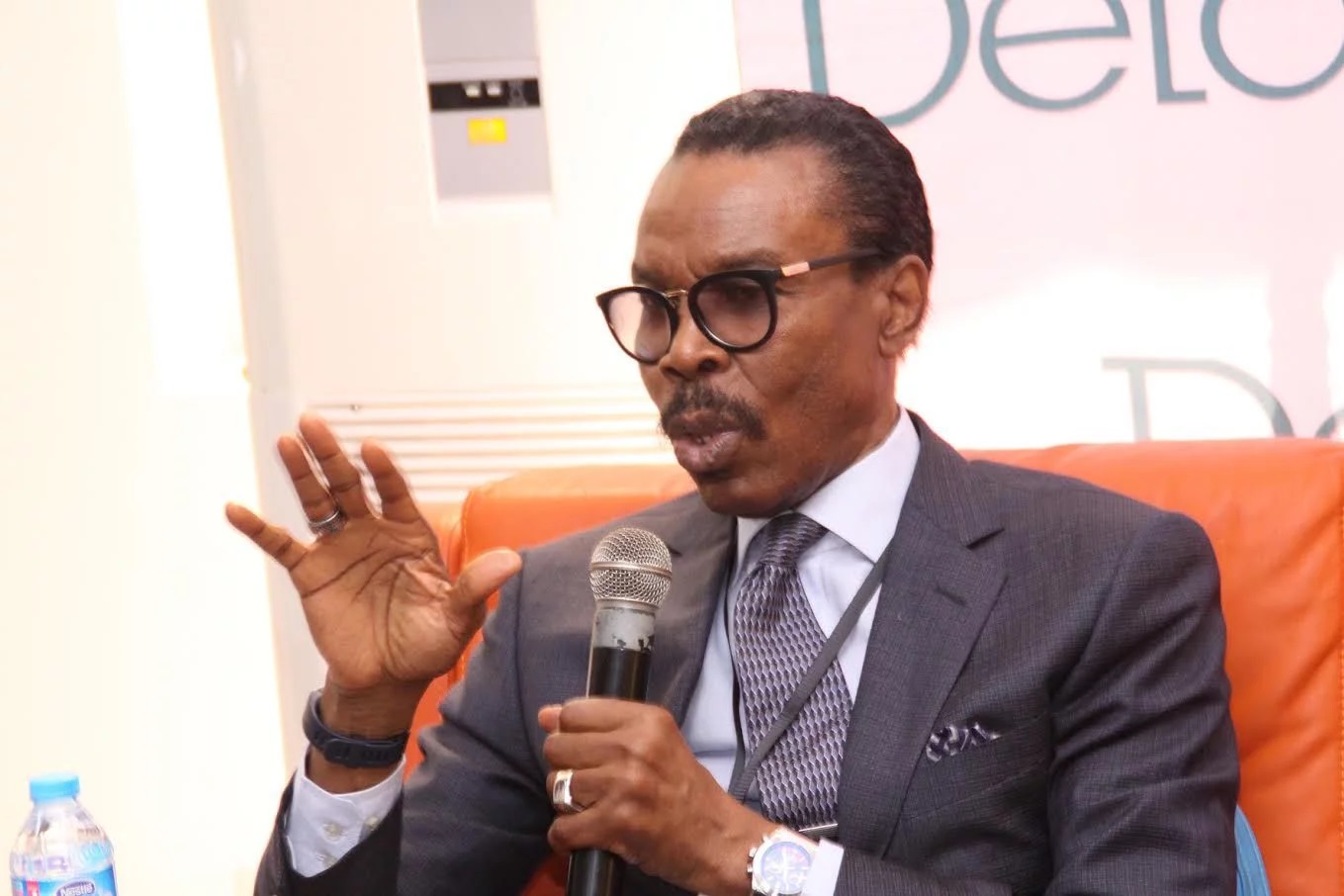Economy
Dangote Refinery Capable Of Solving Nigeria’s Forex Problems; Catalysing Economic Devt, Says S&P Global

International financial analytics corporation, S&P Global, has described the 650,000 barrels per day (bpd) Dangote Oil Refinery and Petrochemicals company as capable of resolving Nigeria’s foreign exchange (forex) issue and its huge pressure on the local Naira currency, while also catalysing the country’s economic development.
S&P Global, headquartered in Manhattan, New York City, disclosed this during an onsite visit to the Dangote Refinery at Ibeju-Lekki, Lagos as part of its sovereign credit ratings assessment of Nigeria. The team from the international rating agency were accompanied by officials from the Federal Ministry of Finance.
S&P noted that the largest single-train refinery complex in the world would bolster Nigeria’s oil sector and, more importantly, also have a positive impact on its growing economy.
Director and Lead Analyst, Sovereign and International Public Finance Ratings, S&P Global Ratings, Ravi Bhatia, who led the delegation to Lagos, said Dangote refinery would transform Nigeria into a net exporter of petroleum products. He added that this transformation is expected to boost revenue generation and alleviate the current pressure on the country’s foreign exchange reserves.
“It is a very impressive facility, able to process 650,000 barrels a day, when in full capacity. It is the largest single-train refinery complex in the world. It came out quite quickly. Nigeria is a big exporter of crude but has issues with importing refined fuels. So, there is a gap in the market where crude can be refined in Nigeria, save money that way, and potentially save some foreign exchange. This will be positive for the economy in the medium term. It looks positive from our assessment,” Bhatia said after an over four-hour tour of the facility.
Also, in a chat with the media, Vice President of Oil and Gas at Dangote Industries Limited (DIL), Devakumar Edwin, who led the team during the tour of the facility, reiterated that by harnessing Africa’s abundant crude oil resources to produce refined products locally, the company aims to catalyse a virtuous cycle of industrial development, job creation, and economic prosperity. He also revealed that, as earlier promised, the company will start the production of premium motor spirit (PMS), this month (July).
Noting that products from the $20 billion facility are of high quality and meet international standards, Edwin said it can meet 100 per cent of Nigeria’s demand for petrol, diesel, kerosene, and aviation Jet, with surpluses available for export.
The S&P team commended the President of Dangote Industries Limited, Aliko Dangote, for integrating advanced technologies and quality control measures, including a state-of-the-art Central Control Unit ensuring smooth automation of operations.
Other members of the team of the international rating agency include the Associate Director, Sovereign Ratings, Maxmillian McGraw; Director, Corporate Ratings, Omegu Collocott; Senior Analyst, Bank Ratings, Charlotte Masvongo, and Director, Financial Services, Samira Mensah.
Currently operating at 350,000 barrels per day capacity, Edwin said the refinery is slated to scale up to at least 500,000 barrels per day capacity by July/August, commencing the refining of petrol and ultra-low sulphur diesel.
He noted that the refinery, designed to process a wide range of crudes including various African and Middle Eastern crudes, as well as US Light Oil, conforms to Euro V specifications. In addition, it is designed to comply with US EPA, European Union (EU) emission norms, the Department of Petroleum Resources (DPR) emission/effluent norms, and the African Refiners and Distribution Association (ARDA) standards.
While noting that most refineries were built by foreign companies, he said it is a thing of pride that a Nigerian company designed and built the world’s largest single-train refinery complex while acting directly as its own Engineering, Procurement, and Construction (EPC) contractor. The refinery also incorporates a self-sufficient marine facility capable of handling the world’s largest vessels.
“The refinery can produce the best quality products in the world, Euro V grade. It is one of the energy-efficient refineries and it is highly environmentally friendly. It is sophisticated with a high level of automation. The largest single train refinery in the world is 100 per cent designed, engineered, and constructed by a Nigerian company as EPC contractor,” he said.
Nigeria, one of the world’s leading oil-producing countries, exports all its crude oil for refining and subsequently imports refined products due to a lack of operational refineries. It is estimated that Nigeria imports at least 50 million litres of petrol per day to meet domestic demand.
According to data from the National Bureau of Statistics (NBS) in its Foreign Trade Statistics for the Fourth Quarter of 2023, Nigeria spent approximately N12 trillion on the importation of petroleum products in 2023, including premium motor spirit (PMS), commonly known as petrol. This figure marks an 18.68% increase compared to the N10 trillion spent on fuel imports in 2022.
Economy
SEE Black Market Dollar To Naira Exchange Rate In Lagos, FCT, 4th January 2025

Bureau De Change (BDC) sources in Gwarimpa and Gwagwalada in FCT buy a dollar for N1760 and sell it for N1770 on Saturday, January 4th, 2024.
Black Market Dollar To Naira Exchange Rate in Lagos and FCT today, 4th January 2025.
The official naira black market exchange rate in Lagos and FCT, Abuja today including the Black Market rates, Bureau De Change (BDC), and CBN rates.
According to Bureau De Change (BDC) sources in the Ogba and Ikeja axis of Lagos state, the exchange rate for a dollar to naira at the Parallel Market (Black Market) was N1750 on Saturday, January 4th, 2024, players bought a dollar for N1750 and sold it for N1760.
Bureau De Change (BDC) sources in Gwarimpa and Gwagwalada in FCT buy a dollar for N1760 and sell it for N1770 on Saturday, January 4th, 2024.
Please note that the Central Bank of Nigeria (CBN) does not recognize the parallel market (black market), as it has directed individuals who want to engage in Forex to approach their respective banks.
Dollar to Naira Black Market Rate Lagos
Dollar to Naira (USD to NGN) Black Market Exchange Rate Today
Buying Rate N1750
Selling Rate N1760
Dollar to Naira Black Market Rate FCT, Abuja
Dollar to Naira (USD to NGN) CBN Rate Today
Buying Rate N1760
Selling Rate N1770
Please note that the rates you buy or sell forex may differ from what is captured in this article because prices vary from state to state across Nigeria.
Economy
Why 1,000 workers left CBN – Cardoso

The Central Bank of Nigeria has again clarified that the 1,000 staff members who opted out of service in December 2024 were not forced to quit their jobs.
The CBN Governor, Olayemi Cardoso, stated this on Friday in Abuja at an investigative hearing of the House of Representatives’ ad-hoc committee probing the circumstances leading to the exit of the staff members and how the sum of N50bn severance package for the affected persons was arrived at.
Cardoso added that the affected persons opted to disengage through the voluntary Early Exit Program with payment of full benefits.
Represented by Deputy Director, Corporate Service of the CBN, Bala Bello, Cardoso explained. “The Early Exit Program, Restructuring and Re-organization “are basically ways and means through which the performance of an organization is optimized by ensuring that round pegs are put in right holes. The manpower requirement of the bank is actually met.
“I’m very happy to mention that the early exit program of the CBN is 100 per cent voluntary. It’s not mandatory. Nobody has been asked to leave, and nobody has been forced to leave. It’s a completely voluntary programme that has been put in place.”
He also noted that the exercise was not restricted to government agencies alone, saying, “I believe several organisations across the world, and even within this country, both in terms of the private sector and the public sector, are undertaking similar exercises.”
Continuing, Cardoso said, “In the past, we had instances in which cases of stagnation and lack of career progression appear. In an organisation, you’ve got a pyramid where from each level to the next level, the gap keeps narrowing. If not, you are going to have a quasi-organisation, an inverted pyramid.
“It gets to the level where you have, for example, 30 departments in the Central Bank. You cannot have 60 directors manning 30 departments. It’s not going to work.
“Once those vacancies are filled, it gets to a level where some people, even though they are very qualified, able, and willing, but the vacancies are not there. And then they got to a level where they are stagnated for a period of time.”
Speaking earlier, the chairman of the committee, Bello Kumo, noted that the committee’s responsibility was to submit the report to the House.
Economy
Tinubu’s 15 percent inflation targets for Nigeria in 2025 unrealistic – Rewane

The Chief Executive of Financial Derivatives and popular economist, Bismark Rewane said President Bola Ahmed Tinubu’s 15 percent inflation target in 2025 is unrealistic and a mere aspiration.
Rewane disclosed on Channels Television’s program on Thursday.
DAILY reports that during Tinubu’s N49.7 trillion budget presentation before the National Assembly on December 18, 2024, he expressed optimism that Nigeria’s inflation rate would decline from 34.60 percent to 15 percent in 2025.
However, Rewane said the President’s target isn’t realistic.
According to him, Nigeria’s inflation can decline to 25 or 27 percent, but the 15 percent is unrealistic.
“Well, the target is an aspiration; the reality that we think is inflation could reduce from approximately 35 percent to somewhere like 27 percent or 25 percent, but a 15% rate on inflation is very bullish and aspirational, but we are free to have our aspirations.
“We deal in the world of reality, and in the world of reality, we see more of 27% to 25%. I would rather bet on that than bet on much more optimistic scenarios,” he said.
When Tinubu was sworn in as Nigeria’s president in May 2023, Nigeria’s inflation rate was 22.41 percent, according to official numbers by the National Bureau of Statistics, NBS.
The inflation rate rose astronomically to 34.6 percent in November 2024, more than 12 percent higher, a development that economic experts have attributed to Tinubu’s twin policies of petrol subsidy removal and unification of the foreign exchange rates.
-

 News17 hours ago
News17 hours agoNigeria Won’t Break Ties With France Over Niger, Others
-

 News17 hours ago
News17 hours agoPortugal Football Club Signs on 19-Year-Old Nigerian- born Footballer, Yaqub Usman-Malah
-

 News14 hours ago
News14 hours agoAfter firing 27 officers with itchy fingers, EFCC reportedly loses over $350k, jewelries
-

 News17 hours ago
News17 hours agoYouth Confab Is A Plan To Compensate Seyi Tinubu’s Friends, Not Nigerian Youths – Sowore
-

 Politics24 hours ago
Politics24 hours agoFear grips APC spokesperson, Morka says ” family received over 400 death threats” after he allegedly threatened Obi
-

 News17 hours ago
News17 hours agoCourt jails man seven years for stealing phone
-

 News13 hours ago
News13 hours agoJust in: FG Endorses Telcos Tariff Increase
-

 News13 hours ago
News13 hours ago59 Traff!cked Kids, Aged 4 To 12, Found In Bus In FCT








